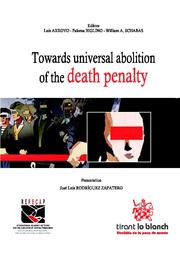This book represents the fírst fruits in the English language of the commítment to make the most recent acadernic texts available to the iníernational community with a view to the abolition of the death penalty or a moratorium on its use. Contríbutions from various cultures and legal traditions around the world are brought together in this edition. They analyze the valué of life and the fundamental rights that were debated, in Madrid, at the Internationaí Symposium for the Abolition of the Death Penalty, organized by the Centre of Political and Constitutionaí Studies and the Institute for European and International Criminal Law of the University of Castilla y La Mancha, in December, 2009, and sponsored by the Spanish Government. It was the occasion for the launch of the International Academic Network against the Death Penalty, the inaugural address for whích was from the President of the Government of Spain, José Luis Rodríguez Zapatero, followed by other conference speeches that appear here for the first time in a collective work. This edition is presented shortly before the opening of the ordinary session of the United Nations where, without a doubt, the Report from the Secretary General will be the focal point of the debate between the delegations of Heads of State and Government, the main themes of which are summarized in the contení of the book that will serve for the debate on the Capital Punishment to take place at the UN General Assembly in December, 2010. Its results will be useñil for the review of the Miüennium Declaration Goals, in 2015. In fact, we are convinced that the debate on the death penalty should coincide with the discussion of the Millennium Goals. The goal of universal aboíition of the death penalty is one of the great ideáis of the United Nations like others that are included in the Millennium Declaration: as Amnesty International proposed, in 1989, we are opposed to the State that kills, and we are against a State and an International Community that allows peopíe to die of hunger and illness in a world that should and íhat can prevent it from happening. Certainly, all couníries have to find their own way and have do so in their own time so as to achíeve abolition; this represents an example of ´variable geometry´ or ´different speeds´ in the harmonízation of international Law. Works such as those that appear in this book support the transforrnation of international civil society so that its ñgurehead may be the principie of human dignity The Academic Network for the abolition of Capital Punishment is committed to this goal and will continué to make documents available to the pubíic from international organisations, NGOs, scientifíc societies and specialised academics through its open access websíte www.academicsforabolition.net.

 Continuar con Google
Continuar con Google Continuar con Facebook
Continuar con Facebook